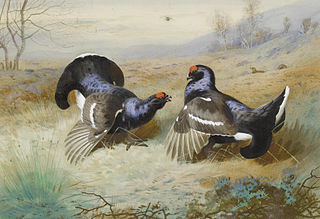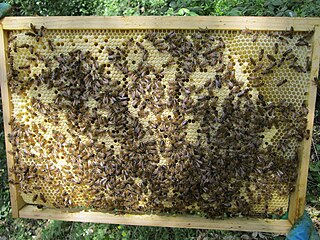
Altruism is the principle and practice of concern for the well-being and/or happiness of other humans or animals above oneself. While objects of altruistic concern vary, it is an important moral value in many cultures and religions. It may be considered a synonym of selflessness, the opposite of selfishness.
Behavior or behaviour is the range of actions and mannerisms made by individuals, organisms, systems or artificial entities in some environment. These systems can include other systems or organisms as well as the inanimate physical environment. It is the computed response of the system or organism to various stimuli or inputs, whether internal or external, conscious or subconscious, overt or covert, and voluntary or involuntary.
Evolutionary psychology is a theoretical approach in psychology that examines cognition and behavior from a modern evolutionary perspective. It seeks to identify human psychological adaptations with regards to the ancestral problems they evolved to solve. In this framework, psychological traits and mechanisms are either functional products of natural and sexual selection or non-adaptive by-products of other adaptive traits.

Social norms are shared standards of acceptable behavior by groups. Social norms can both be informal understandings that govern the behavior of members of a society, as well as be codified into rules and laws. Social normative influences or social norms, are deemed to be powerful drivers of human behavioural changes and well organized and incorporated by major theories which explain human behaviour. Institutions are composed of multiple norms. Norms are shared social beliefs about behavior; thus, they are distinct from "ideas", "attitudes", and "values", which can be held privately, and which do not necessarily concern behavior. Norms are contingent on context, social group, and historical circumstances.
Social learning is a theory of learning process social behavior which proposes that new behaviors can be acquired by observing and imitating others. It states that learning is a cognitive process that takes place in a social context and can occur purely through observation or direct instruction, even in the absence of motor reproduction or direct reinforcement. In addition to the observation of behavior, learning also occurs through the observation of rewards and punishments, a process known as vicarious reinforcement. When a particular behavior is rewarded regularly, it will most likely persist; conversely, if a particular behavior is constantly punished, it will most likely desist. The theory expands on traditional behavioral theories, in which behavior is governed solely by reinforcements, by placing emphasis on the important roles of various internal processes in the learning individual.

Group selection is a proposed mechanism of evolution in which natural selection acts at the level of the group, instead of at the level of the individual or gene.

Cooperation takes place when a group of organisms works or acts together for a collective benefit to the group as opposed to working in competition for selfish individual benefit. In biology, many animal and plant species cooperate both with other members of their own species and with members of other species with whom they have relationships.
Evolutionary anthropology, the interdisciplinary study of the evolution of human physiology and human behaviour and of the relation between hominids and non-hominid primates, builds on natural science and on social science. Various fields and disciplines of evolutionary anthropology include:
In evolutionary biology, inclusive fitness is one of two metrics of evolutionary success as defined by W. D. Hamilton in 1964:

David Sloan Wilson is an American evolutionary biologist and a Distinguished Professor Emeritus of Biological Sciences and Anthropology at Binghamton University. He is a son of author Sloan Wilson, and co-founder of the Evolution Institute, and co-founder of the spinoff nonprofit Prosocial World. He has studied social evolution in Binghamton.
Dual inheritance theory (DIT), also known as gene–culture coevolution or biocultural evolution, was developed in the 1960s through early 1980s to explain how human behavior is a product of two different and interacting evolutionary processes: genetic evolution and cultural evolution. Genes and culture continually interact in a feedback loop: changes in genes can lead to changes in culture which can then influence genetic selection, and vice versa. One of the theory's central claims is that culture evolves partly through a Darwinian selection process, which dual inheritance theorists often describe by analogy to genetic evolution.

Sociality is the degree to which individuals in an animal population tend to associate in social groups (gregariousness) and form cooperative societies.
The concept of the evolution of morality refers to the emergence of human moral behavior over the course of human evolution. Morality can be defined as a system of ideas about right and wrong conduct. In everyday life, morality is typically associated with human behavior rather than animal behavior. The emerging fields of evolutionary biology, and in particular evolutionary psychology, have argued that, despite the complexity of human social behaviors, the precursors of human morality can be traced to the behaviors of many other social animals. Sociobiological explanations of human behavior remain controversial. Social scientists have traditionally viewed morality as a construct, and thus as culturally relative, although others such as Sam Harris argue that there is an objective science of morality.

The evolutionary origin of religion and religious behavior is a field of study related to evolutionary psychology, the origin of language and mythology, and cross-cultural comparison of the anthropology of religion. Some subjects of interest include Neolithic religion, evidence for spirituality or cultic behavior in the Upper Paleolithic, and similarities in great ape behavior.

Eusociality, the highest level of organization of sociality, is defined by the following characteristics: cooperative brood care, overlapping generations within a colony of adults, and a division of labor into reproductive and non-reproductive groups. The division of labor creates specialized behavioral groups within an animal society which are sometimes referred to as 'castes'. Eusociality is distinguished from all other social systems because individuals of at least one caste usually lose the ability to perform at least one behavior characteristic of individuals in another caste. Eusocial colonies can be viewed as superorganisms.
Mary Jane West-Eberhard is an American theoretical biologist noted for arguing that phenotypic and developmental plasticity played a key role in shaping animal evolution and speciation. She is also an entomologist notable for her work on the behavior and evolution of social wasps.
Evolutionary psychology has traditionally focused on individual-level behaviors, determined by species-typical psychological adaptations. Considerable work, though, has been done on how these adaptations shape and, ultimately govern, culture. Tooby and Cosmides (1989) argued that the mind consists of many domain-specific psychological adaptations, some of which may constrain what cultural material is learned or taught. As opposed to a domain-general cultural acquisition program, where an individual passively receives culturally-transmitted material from the group, Tooby and Cosmides (1989), among others, argue that: "the psyche evolved to generate adaptive rather than repetitive behavior, and hence critically analyzes the behavior of those surrounding it in highly structured and patterned ways, to be used as a rich source of information out of which to construct a 'private culture' or individually tailored adaptive system; in consequence, this system may or may not mirror the behavior of others in any given respect.".
Cultural evolution is an evolutionary theory of social change. It follows from the definition of culture as "information capable of affecting individuals' behavior that they acquire from other members of their species through teaching, imitation and other forms of social transmission". Cultural evolution is the change of this information over time.
Social selection is a term used with varying meanings in biology.
Reciprocal altruism in humans refers to an individual behavior that gives benefit conditionally upon receiving a returned benefit, which draws on the economic concept – ″gains in trade″. Human reciprocal altruism would include the following behaviors : helping patients, the wounded, and the others when they are in crisis; sharing food, implement, knowledge.







